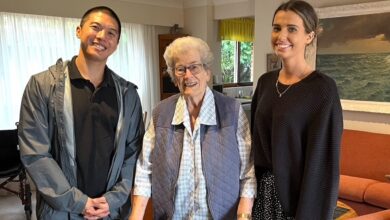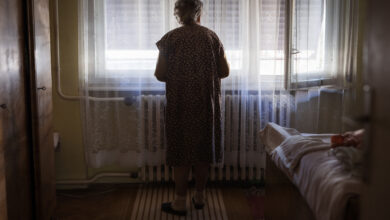Nurses set new mums on the right path through the right@home program

New research has found that mothers from disadvantaged backgrounds show improved mental and physical wellbeing when given regular visits from maternal and child health nurses during pregnancy, and up until the child is two years old.
Maternal mental health is crucial for the health and wellbeing of young children and the early intervention program used, called right@home, found benefits in new mothers and their children up to a year after the visits ended.
The right@home program, led by Murdoch Children’s Research Institute (MCRI), involved 722 women from child and family health services at 10 hospitals across Victoria and Tasmania and was the largest trial of a nurse home visit program in Australia.
Women in the intervention group received 25 home visits overall and reported lower rates of depression, anxiety and stress compared to those who received the standard free centre-based nurse consultations in Victoria (nine visits) and Tasmania (six visits).
"One in five children arrive at school already with with some level of developmental disadvantage. And the question is, what could we do with the system that's likely to make a difference to the inequitable outcomes for kids?" said Professor Sharon Goldfeld from MCRI.
"We know for the disadvantaged, the areas of the brain that are most impacted, is the area responsible for language and responsible for self regulation, which is pretty important for school. Imagine if we could do something that really worked on that area, so that's what we did.
"right@home focused on three things, parent care of the child, so feeding, sleeping, safety. Parent responsivity, or bonding. And the home environment, play and language."
And the nurse role was key in the right@home process.
"There's actually been some research using paraprofessionals to do the same work, and while paraprofessionals can definitely develop a relationship, it doesn't seem to have the same impact outcomes that we see only with nurses," said Goldfeld.
"And I think it's because of the qualifications of the nurses. I think it's the non-stigmatising relationship that a nurse can have. And I think it's also the great amount of skill that a healthcare professional like a nurse can bring. I think for all of those reasons, that's why it seems to work with nurses."
Goldfeld said that there has been little data about the rates of poor mental health of mothers after the child turns one, although anecdotally the researchers know this burden is likely to be great. Research has found that mothers who live disadvantage are more likely to have higher rates of poor maternal mental health and nurse home visiting has shown to make a difference.
Carla Bonacci joined the program a week after her daughter was born and said she would have struggled without the regular home nurse visits.
“I really needed the support, especially during the first few months after giving birth,” she said.
“The nurses guided me through from helping with feeding and bonding to managing my daughter’s sleep.
“Being a single, first-time mum, I wasn’t confident but they gave me that reassurance, which has greatly helped my mental health and allowed me to be the best mum I can be.”
A WHO study on maternal mental health states that antenatal maternal anxiety significantly predicted behavioural/emotional problems in four-year-old boys and girls. This persisted for up to 33 months postnatally. Similarly, a Harvard paper on maternal mental health states that "children of depressed mothers show patterns of brain activity that are similar to those found in adults with depression".
An Australian study also found that prenatal maternal depressive symptoms predicted worse physical health during early childhood and that by age 20, these children exhibited increased health-related stress and poor social functioning which predicted depressive symptoms later in young adulthood.
Goldfeld said that the data from right@home can't predict these types of outcomes yet, but early childhood intervention is key.
"Early childhood is such an important time for people, children laying down the pathways to the right outcomes. But even in the best of circumstances, I do have one caveat. right@home is really important, but as part of a compendium of things we think about that are likely to address the equity gap for kids," she said.
"I think we need to be really conscious that we need to think of a larger number of these sorts of things, what we call a stacking approach. What do you need in the antenatal period? What do you need in the perinatal period? What do you need in the first few years in health, in education and social care that's mutually beneficial, so that by the time kids get to grade three, they're really on their optimum pathways. That's when we'll know we've made a difference.
“We do not want babies born into adversity to be on a pathway where they are unlikely to catch up with their peers,” she said.
“Everyone should have the opportunity to raise happy, thriving children who are more likely to do better in school, have good relationships in the community, and lead healthier lives.”
Email: [email protected]





